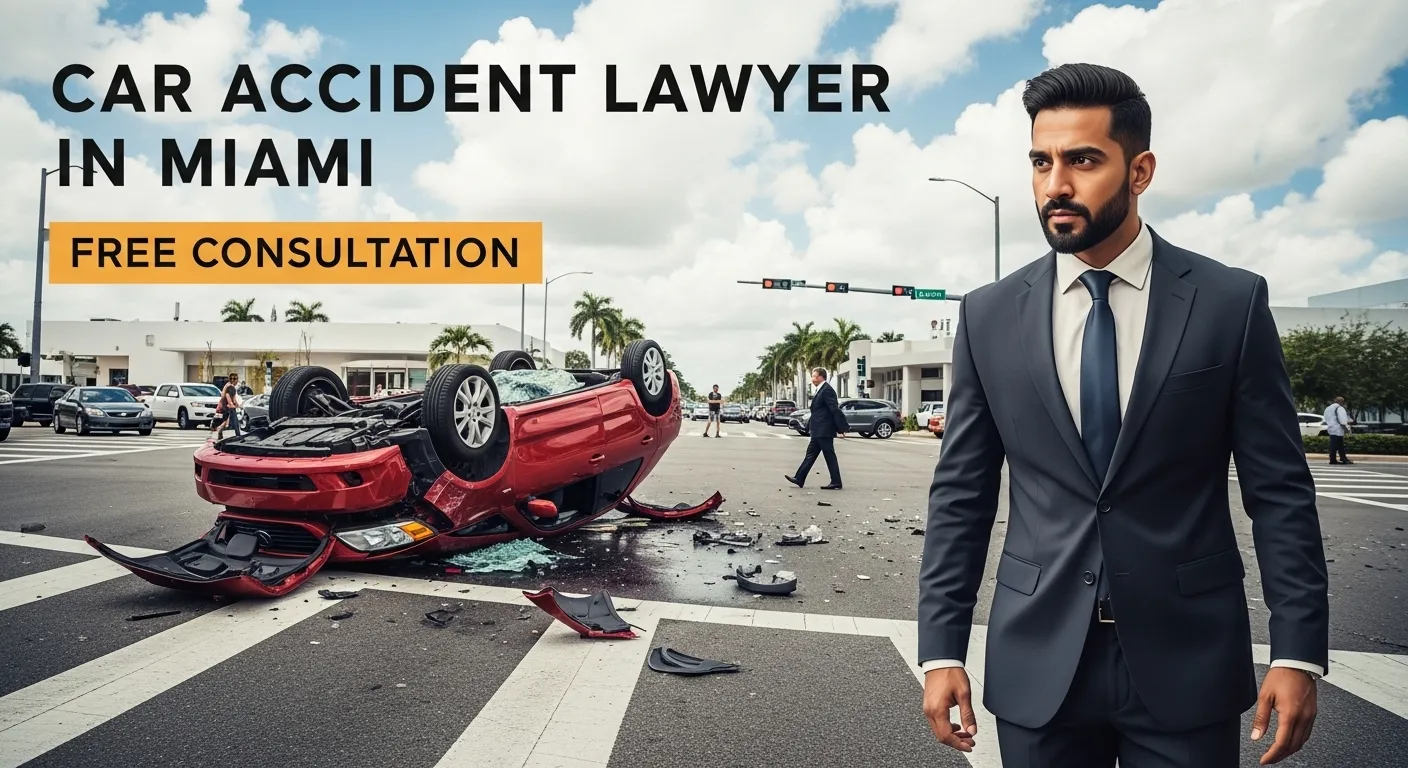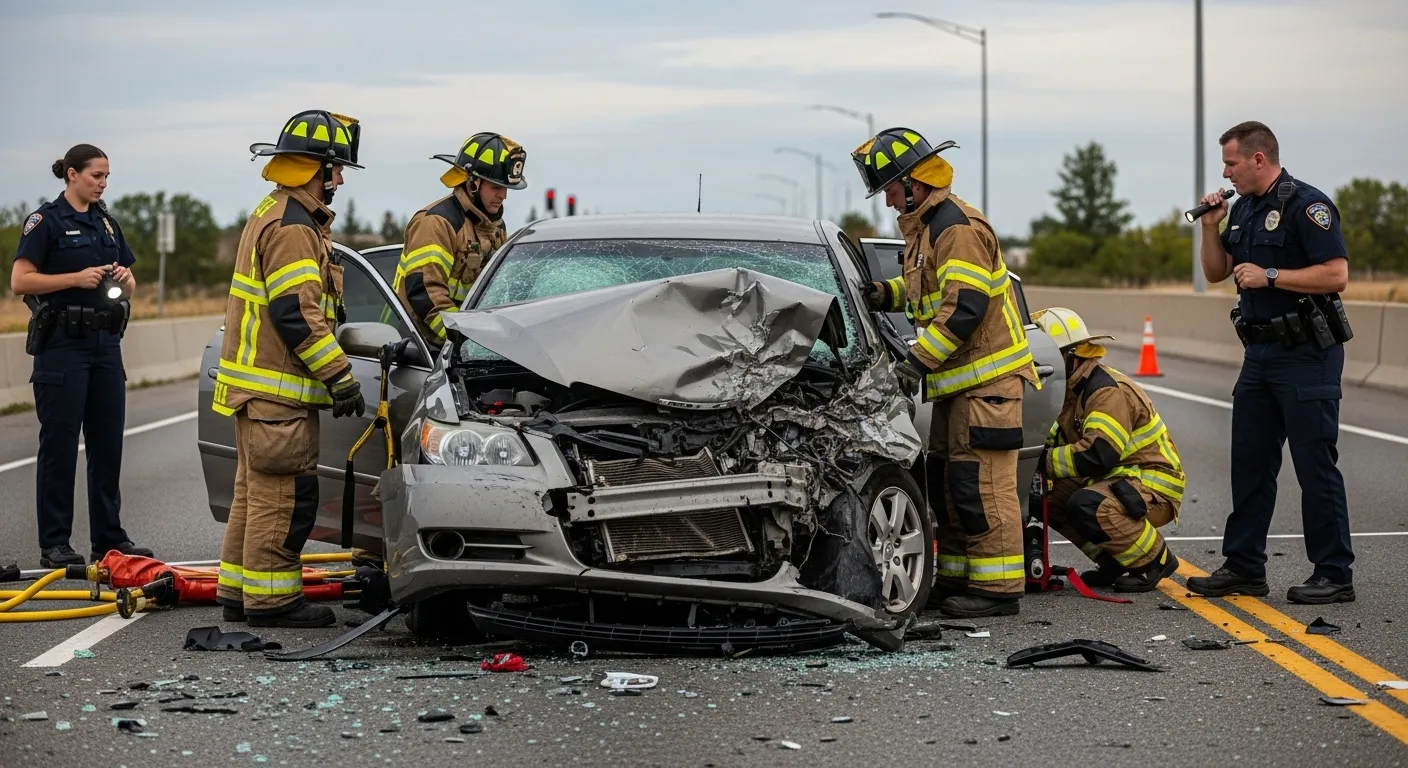What to Do After a Car Accident in Miami (A Step-by-Step Guide)

A car crash happens in an instant, but the consequences can last a lifetime. You're suddenly facing physical pain, emotional trauma, a damaged vehicle, and a mountain of unexpected bills. It’s overwhelming.
In this confusing time, knowledge is your most powerful tool. Understanding your legal rights is the first and most critical step toward protecting yourself and securing the financial compensation you need to recover. This guide will walk you through everything you need to know about navigating car accident claims.
Immediate Steps to Protect Your Claim
What you do in the minutes and hours after a crash is incredibly important. The actions you take at the scene can significantly strengthen or weaken your future car accident claim.
Think of yourself as the lead investigator of your own case. Here's your checklist:
- Prioritize Safety: If you can, move your vehicle off the road to avoid further collisions. Turn on your hazard lights. Your well-being comes first.
- Call 911: Always report the accident to the police, no matter how minor it seems. A formal police report is a vital piece of evidence that documents the facts of the crash.
- Document Everything: Take photos and videos of everything. This includes damage to all vehicles from multiple angles, skid marks, road conditions, traffic signs, and any visible injuries you have.
- Exchange Information: Get the other driver's name, address, phone number, driver's license number, license plate number, and insurance company information. Do not apologize or admit any fault.
- Identify Witnesses: If anyone saw the accident, politely ask for their name and contact information. Their objective account can be invaluable.
- Seek Immediate Medical Attention: This is crucial. Even if you feel fine, adrenaline can mask serious injuries like whiplash or internal bleeding. Going to a doctor creates an official medical record linking your injuries to the accident.
Understanding the Full Value of Your Claim
One of the biggest mistakes accident victims make is underestimating what their claim is actually worth. It’s not just about the immediate medical bills. Compensation, legally known as "damages," covers all losses resulting from the other party's negligence.
These damages are typically broken into two categories:
1. Economic Damages (The Tangible Costs)
These are the specific, calculable financial losses you've incurred. You need to keep detailed records of every single expense.
- Past and Future Medical Bills: This covers everything from the ambulance ride and ER visit to surgeries, physical therapy, prescription drugs, and any anticipated future medical care.
- Lost Wages: If you missed work while recovering, you are entitled to that lost income. This also includes any lost bonuses, commissions, or overtime.
- Loss of Earning Capacity: If your injuries are permanent and prevent you from returning to your old job or earning the same income, you can be compensated for this future loss. This is a complex calculation that often requires expert analysis.
- Property Damage: This is the cost to repair or replace your vehicle and any other personal items damaged in the crash, such as a laptop, phone, or child car seat.
- Out-of-Pocket Expenses: This includes costs like rental cars, transportation to doctor's appointments, or hiring help for household chores you can no longer do.

2. Non-Economic Damages (The Human Cost)
These damages are harder to put a number on, but they are just as real and often represent the largest part of a settlement. They compensate you for the human impact the accident has had on your life.
- Pain and Suffering: This compensates you for the physical pain, discomfort, and general suffering your injuries have caused.
- Emotional Distress: Accidents are traumatic. This covers the psychological impact, such as anxiety, depression, fear of driving, insomnia, or Post-Traumatic Stress Disorder (PTSD).
- Loss of Enjoyment of Life: This addresses your inability to enjoy daily activities, hobbies, or life events that you previously cherished.
- Loss of Consortium: This is a claim for the negative impact the injuries have had on your relationship with your spouse, such as the loss of companionship, support, and intimacy.
How a Personal Injury Lawyer Fights for You
Trying to handle a car accident claim alone while you're recovering is a recipe for disaster. Hiring a skilled personal injury attorney levels the playing field and is the single most effective step you can take to maximize your compensation.
An expert lawyer will:
- Conduct a Thorough Investigation: We gather police reports, interview witnesses, and may even hire accident reconstruction experts to prove exactly how the crash happened and who is at fault.
- Accurately Calculate Your Damages: We work with medical and financial experts to calculate the true, long-term cost of your accident, ensuring no expense is overlooked.
- Handle All Communication: We take over all calls and paperwork from the insurance companies. You can focus entirely on getting better while we handle the legal battle.
- Negotiate Aggressively: We are skilled negotiators who know the tactics insurers use. We will fight for a full and fair settlement that covers all your losses.
- Take Your Case to Court: If the insurance company refuses to make a fair offer, we are fully prepared to take them to trial to demand justice for you.
Frequently Asked Questions
How much does a car accident lawyer cost in Miami?
At Justice & Advocates, we work on a contingency fee basis. This means you pay us nothing upfront. We only get paid a percentage of the compensation we recover for you. If we don't win your case, you owe us nothing.
What is the statute of limitations for a car accident claim in Florida?
In Florida, the statute of limitations for filing a personal injury lawsuit is generally two years from the date of the accident. It is crucial to contact a lawyer well before this deadline to protect your rights.
Should I talk to the insurance company after a crash in Miami?
It is highly recommended that you do not give a recorded statement to the other driver's insurance company without first consulting your own lawyer. Their goal is to minimize your claim. Let your attorney handle all communications with the insurance adjusters.
Don't Wait to Protect Your Rights.
The clock is ticking on your claim. The longer you wait, the harder it can be to get the compensation you deserve. Let our Miami car accident lawyers handle the stress of your claim so you can focus on what matters most: your recovery.
Get Your Free Case Review Now →No Fees Unless We Win Your Case.